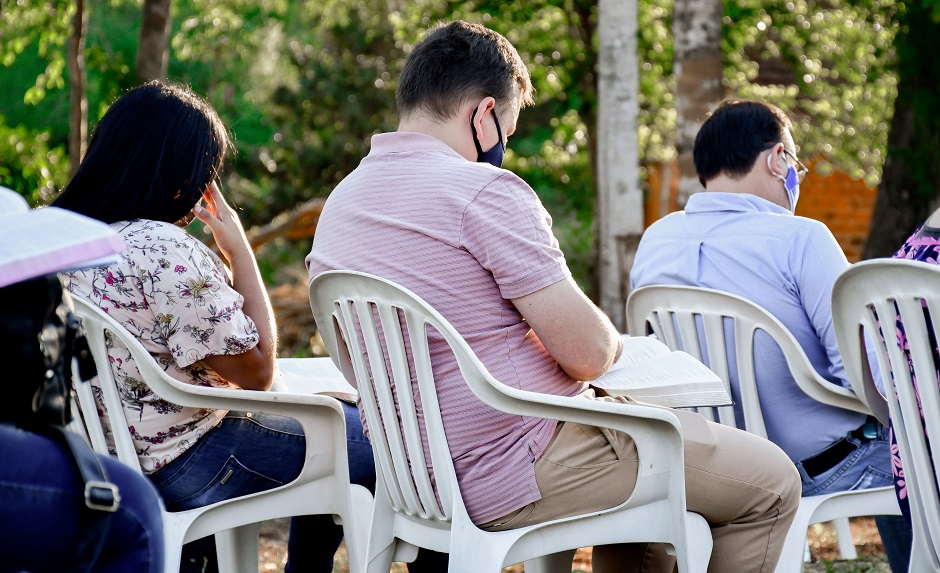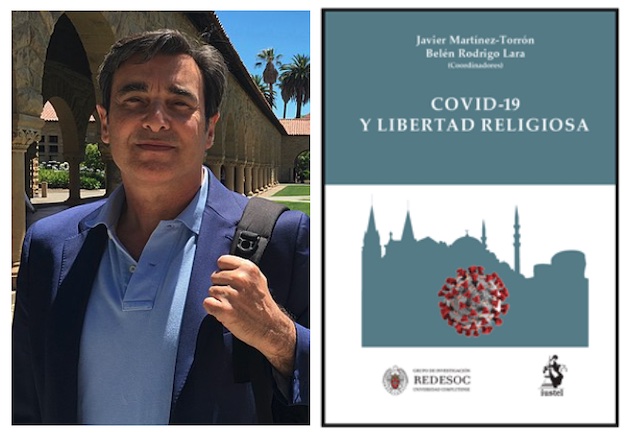“The lack of understanding of religion leads to trying to reduce its presence in the public space”
Law professor Javier Martínez Torrón has coordinated the book “Covid-19 and religious freedom”, which compares how governments like Spain, United Kingdom, Italy or the United States, related to faith groups during the pandemic.
FREIBURG · 19 APRIL 2021 · 17:50 CET

All around the world, the handling of the Covid-19 pandemic has led to a range of exceptional measures which have restricted fundamental rights, including religious freedom.
A new book edited by Javier Martínez Torrón (a Law Professor of the Complutense University of Madrid, Spain) and Belén Rodrigo Lara looked at the decisions made by the governments of 17 countries, and how these restrictions affected faith groups.
The 500-pages book “Covid y la libertad religiosa” (“Covid-19 and Religious Freedom”, Editorial Iustel, 2021) portrays a very updated panorama of how politicians relate to faith groups.
Martínez-Torrón spoke to Spanish news website Protestante Digital from Freiburg (Germany), where he is doing research at the moment.
Question. What was the origin of this book and what does it seek to achieve?
Answer. Soon after the first impact of being confined in strict lockdowns, I realised that a big interest appeared in analysing how the restrictions would influence the religious expressions of people. The world of religious people has been very much affected by the restrictions.
Most churches in Spain had a very positive response to the first set of government measures. People trusted the government and their authority to implement the restrictions. There was not a big interest in a legal perspective back then. But this was different in other countries, like the United States, where heated debates started early in the beginning, as well as in Italy or the United Kingdom.
It was in this context that several of us, legal experts in several countries saw that this was an issue that needed to be addressed.
But even in Spain, as time went by, some conflicts started to appear. For instance, an evangelical church in the south rejected the suspension of church activities. Similar episodes were seen in some Islamic centres. Some Catholic worship services were interrupted, and all these situations created a climate of tension. In Spain, at the beginning, there was uncertainty and confusion because worship places could remain open but attending a worship service was not permitted. In other places, like Denmark, UK, Germany, worship places were closed.
The book has over 500 pages, with two chapters of introduction, a conclusion, and 19 other chapters: nine analise the situation of religious freedom during the pandemic in several European countries, including the Vatican, and the rest looks at eight countries of the American continent.
The book was written in a record time, if we compare it with the time it takes for such a work in the field of legal specialities. This was possible thanks to the good work of the Editorial Iustel publishing house.

Javier Martínez Torrón is one of the editors of the book, published in March 2021. Question. Throughout the last year, governments and courts have clashed several times over the limits of restrictions. Is this a sign that new norms should developed to help avoid these tensions?
A. In the book, we have not looked so much at the specific laws, but the radiography of the social and legal structures that the states have when it comes to facing such a big crisis. We have looked at the key resources the countries have and the deficiencies in how they use those.
My opinion and that of many other jurists, is that we live in societies in which there is an overabundance of rules. Most governments try to measure their efficiency on how many new norms they have been able to produce. To me, this is an important mistake, because so many times that normative structure is already functional enough, and the problem lies purely in the administration area. We have created a culture where it seems that the more laws, the better government. But this is not necessarily the case.
On the other hand, we should ask ourselves if our constitutions are clear enough about what aspects should be regulated by a “state of alarm” or a “state of exception”. Thinking, for instance, about how the different layers of political power (national, regional, local) should interact with each other, as well as which should be the channels of communication (and this is especially important in the religious sphere) between public powers and civil society.
There has been, at least in appearance, a certain eagerness of the central powers to present themselves as the great managers, which has sometimes led to precipitation. The state cannot deal with a crisis of this calibre alone. We have seen this everywhere. The state must be able to act with the participation of other actors in society.
On the one side, the states see themselves as omnipotent, and therefore channels of collaboration with the civil society do not exist, and if they exist they are not used. On the other hand, citizens think that any problem that appears should be solved by the state. Many people have a wrong perception about the dimension of the exercise of power, and this is impoverishing our social dynamics.
Society should have a structure and strength in itself, independent from the public powers. Civil society has to work with the power, and viceversa.
In Spain, there has not been a good example of collaboration with the religions, religious minorities included. When one thinks of how much collaboration could happen (realising the big networks that organised religion has in the country) and the fact that all this has not been used, it makes you wonder. Religions have been very active: Aid work, help, coordination and mobilisation of volunteers, and other non-tangibles, such as the promotion and implementation of protection measures, or convincing the population of their ethic responsibility and solidarity with others, beyond the loyalty to the government.
Spain has clear representatives for all religious confessions, including the most important faith minorities. There is a Religious Freedom Advisory Commission where all main religions are engaged, but it has not been used once in this last year. Something similar has happened in other countries. It is a waste of means that the state has not been capable of seeing and taking advantage of the immense potential of civil society, which is necessary because the administration by itself is not able to carry with everything in such a crisis.
Q. Could it be that a part of society considers that the religious realities should be confined to the private sphere and not be given the change to actively participate in the solutions to this crisis?
A. On one side, there is mistaken perception of what religious beliefs really are, because these have a internal community expression that is key. But they also have an impressing social usefulness for whoever that understands how things work. Organised religions offer solidarity, altruism, social care. And sometimes, I have to say, there is a perverse interest by some media of presenting the world of organised religion as something negative. Only the extremes are presented, but extremist people are everywhere, and it is not the real picture of religion. Faith communities tend to be formed by people with high ethical standards, much care for society, not only for their own members but for everyone else, an interest in helping the neighbour.
Often there is a lack of understanding of this religious world, and the consequence is that some try to reduce its presence in the public space. It can be a lack of understanding, or in some cases, a specific interest in hiding what religions do.
Germany would be an example where this has been different. There has been much more collaboration of the institutionalised churches with the public powers than in other countries, because there is a culture of collaboration between religions and the administration. Both share, in their own way, an interest in caring about society (although that does not mean that religions and the state have the same vision - actually that would be inadequate and counter-productive).
I get irritated when I hear certain political representatives say things such as: “Not one euro of our taxes should go to religion”. They say they defend public education, as if the education in a centre operated by religious entities was not public.
A hospital or a school, no matter who owns them, does a public service. The function of a secondary school is public, it does not matter if it is of the state or of a Catholic or evangelical institution, or a secular group. There is a massive confusion around the word “public”. Public means that it belongs to all and affects us all, it has nothing to do with the ownership. This confusion is part of the public discourse, and some use it for their interests.
Q. Do you think there has been an excess of restrictions, which could affect the free exercise of religion?
A. In general, I do not think there has been a discriminatory treatment of the religious world, compared to the world of businesses, sport, or leisure. One can discuss if certain restrictions are appropriate or not, for instance, I believe some measures imposed for outdoors activities are too drastic given the low possibility of infection when social distancing is respected.
But I would not say that religious freedom has been mistreated in comparison with other freedoms. Churches have not been mistreated in comparison with other sectors. I could not say the same of some other countries, where restrictions to religious communities were more difficult to justify rationally.
Q. You insist much in the fact that religious institutions should get involved more explicitly in the exit of this crisis. How should this look like?
Answer. Well, in the first place the authorities need to be receptive. We have seen businesspeople offering help in the midst of this crisis, and being ignored by the state authorities, leading to perplexity among many. With churches, something similar happens. Authorities must learn to listen.
In the second place, we should use what we already have. I mentioned the Religious Freedom Advisory Committee before, and it has been underused since its creation. The mechanism has an excellent design, but it has not been used well, they have not been listened enough - and when they have been heard, their ideas have not been implemented.
Thirdly, we need to generate stable channels of communication with the main sectors of civil society, those actors who could get involved in helping in this crisis. Religions, associations of families, health institutions… The state should discover which are the main focus of social action, and cooperate. This is the soil on which we need to work, and this ground naturally includes religious groups.
Published in: Evangelical Focus - life & tech - “The lack of understanding of religion leads to trying to reduce its presence in the public space”
More News
Most read
Since you are here…
Evangelical Focus is a news and opinion platform that brings together Christians from across Europe and other parts of the world. We need the support of our readers to make this media project sustainable in the long term. You can support our work! Read about Evangelical Focus’s sustainability here.
Would you like to support the work of Evangelical Focus?
Use one of these methods. You can also transfer your donation to “Areópago Protestante / Evangelical Focus” IBAN: ES8521000853530200278394 (Swift / BIC: CAIXESBBXXX). Subject: “Donation Evangelical Focus”
